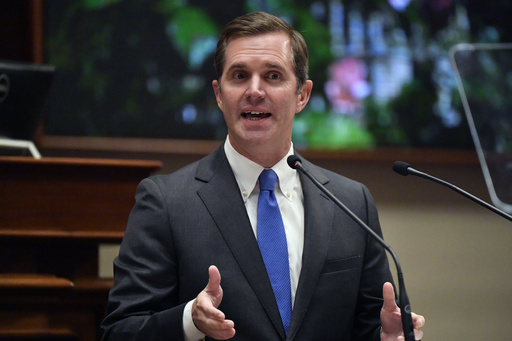
Democratic Governor Andy Beshear enacted a new law on Thursday designed to lower Kentucky’s personal income tax, expressing optimism that the anticipated economic growth will compensate for the anticipated revenue shortfall.
The legislation, which will decrease the tax rate from 4% to 3.5% effective next year, progressed smoothly through the predominantly Republican Legislature within just five days of its session. Beshear fulfilled his promise to endorse this tax cut, which is aimed at providing relief for Kentuckians facing persistently high consumer prices.
“This decision will enable you to retain more of your earnings during a period of rising costs,” Beshear stated during his weekly press conference at the Statehouse.
The tax reduction was a significant priority for Republican leaders and represents the latest in a series of such cuts since the GOP took full control of the legislature in 2017. Advocates assert that the reduced rate will foster long-term economic growth and attract more residents to Kentucky by allowing individuals to keep a greater portion of their income.
On Thursday, Beshear highlighted an analysis that estimated the half-percentage point reduction would lead to a decrease in the state’s general fund revenues by approximately $718 million each year once fully in effect. The general fund supports most essential state services, including education, healthcare, and public safety.
Democratic legislators exhibited differing opinions regarding the bill, with opponents arguing that the loss in revenue could threaten vital services during economic downturns. Nonetheless, Beshear remained confident in the state’s ability to manage this revenue loss.
“I am convinced that the growth we are witnessing in various revenue areas will enable us to handle this situation effectively,” he remarked.
He cited significant private-sector investment and job growth in Kentucky over recent years as indicators of positive economic trends, attributing these achievements to the business-friendly policies introduced by Republican lawmakers.
According to the state budget director’s office, general fund tax receipts in December rose by 4.5% compared to the same time last year, with a 1.7% increase noted for the first half of the fiscal year ending June 30.
The movement toward tax reductions in Kentucky aligns with similar proposals from former President Donald Trump for both individuals and businesses, as various governors and legislative bodies in different states pursue further tax cuts. This momentum comes despite a backdrop of slowing or stagnant revenue growth across the nation, following numerous state income, sales, and property tax reductions in recent years.
Since the implementation of a tax overhaul in 2022, Kentucky’s individual income tax has been gradually cut by half-percentage point increments, contingent upon meeting specific benchmarks to maintain sufficient revenue levels for state expenditures.
This overhaul also saw the extension of the state sales tax to cover more services. Critics argue that low-income families have been disproportionately affected by the application of the sales tax to additional services.
During recent state Senate discussions regarding the income tax reduction, several Republican members expressed that this latest decrease is a stepping stone toward their ultimate goal of completely abolishing the individual income tax.
Beshear’s stance on tax cuts has not been straightforward. He approved an earlier half-point reduction of the personal income tax in 2023, but he vetoed the 2022 tax overhaul due to concerns over the extended sales tax on more services. However, Republican legislators successfully overrode his veto. In response, the governor advocated for a previously unsuccessful initiative aimed at temporarily lowering the state sales tax rate to alleviate the financial burden of rising inflation on consumers.

